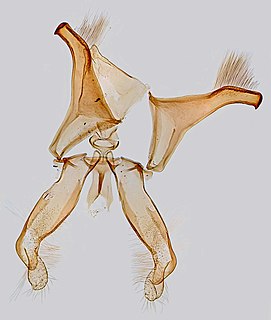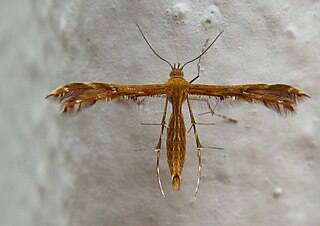 W
WAdaina microdactyla is a moth of the family Pterophoridae first described by Jacob Hübner in 1813. Also known as the hemp-agrimony plume, it is found in Africa, Asia and Europe.
 W
WCrombrugghia distans, also known as the Breckland plume is a moth of the family Pterophoridae found in Africa, Asia and Europe. It was first described by Philipp Christoph Zeller in 1847.
 W
WCrombrugghia laetus, also known as the scarce light plume is a moth of the family Pterophoridae, found in southern Europe, North Africa, the Canary Islands, Asia Minor and Iraq. It was first described by Philipp Christoph Zeller in 1847.
 W
WEmmelina monodactyla is a moth of the family Pterophoridae. It is found in Europe, Japan, central Asia, North Africa and North America.
 W
WHellinsia carphodactyla is a moth of the family Pterophoridae, first described by Jacob Hübner in 1813. It is known from most of Europe, Asia Minor and North Africa.
 W
WHellinsia lienigianus is a moth of the family Pterophoridae which inhabits coastal areas, dry pastures and waste ground and is found in Africa, Asia, Australia and Europe. Also known as the mugwort plume it was first described by Philipp Christoph Zeller in 1852.
 W
WHellinsia osteodactyla is a moth of the family Pterophoridae. It is found in most of Europe, as well as North Africa and from Asia Minor to Japan. Also known as the small golden-rod plume it was first described by Philipp Christoph Zeller in 1841.
 W
WMerrifieldia chordodactylus is a moth of the family Pterophoridae. It is found on the Canary Islands and in Spain. It has also been recorded from Algeria and Morocco.
 W
WMerrifieldia leucodactyla, also known as the thyme plume, is a moth of the family Pterophoridae, and is known from most of Europe, as well as North Africa and Asia Minor. It was first described by the Austrian lepidopterists, Michael Denis and Ignaz Schiffermüller in 1775).
 W
WOidaematophorus borbonicus is a moth of the family Pterophoridae that is known from La Réunion.
 W
WOxyptilus parvidactyla, also known as the small plume, is a moth of the family Pterophoridae found in Africa, Asia and Europe. It was first described by Adrian Hardy Haworth in 1811.
 W
WPterophorus pentadactyla, commonly known as the white plume moth, is a moth in the family Pterophoridae. It is found in the West Palearctic including North Africa and Europe. The wingspan is 26–34 mm (1.0–1.3 in). It is uniformly white, with the hind wing pair divided in three feathery plumes and the front pair in another two. The moths fly from June to August. The larvae feed on bindweed.
 W
WStenodacma wahlbergi is a moth of the family Pterophoridae described by Philipp Christoph Zeller in 1851. It is known from Japan, China, Saudi Arabia, Iran, Sri Lanka, India, Central, East and South Africa, St. Helena, Mauritius, the Seychelles and Rodriguez Island. It has recently been recorded from Vietnam. Records for Australia were based on synonymisation with Stenodacma pyrrhodes.
 W
WStenoptilia bipunctidactyla, also known as the twin-spot plume is a moth of the Pterophoroidea family found in North Africa, Asia and Europe. It was first described by the Austrian physician and naturalist, Giovanni Antonio Scopoli in 1763. It is one of four similar looking moths.
 W
WWheeleria spilodactylus is a moth of the family Pterophoridae, first described by John Curtis in 1827. It is found in South-Western and Central Europe and the Mediterranean, Asia Minor and North Africa. It has been introduced to Australia as a biocontrol agent for white horehound.